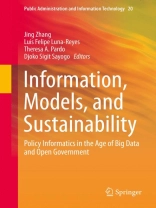This book reflects on the emerging trends, development, and challenges of policy on sustainability using information technology, and provides valuable insights to both research and practice communities. Sustainability has become an important focus for government, civil society and the corporate community world-wide. Growing interest in addressing environmental deterioration and associated social inequality and economic challenges is shifting focus to this important issue. The lack of fresh water and arable land, extreme weather, rising cost of relying on fossil fuels, and poverty and regional instability, are drawing attention to the need for government intervention and policy instruments that encourage the development of sustainable alternatives. Governments can play a very important role in facilitating sustainable development through better public policies. First of all, public investments can be directed toward establishing incentives for renewable energy, energy efficiency, sustainable agriculture, and land and water conservation, or toward leveling the field for sustainable alternatives by phasing out the subsidies directed to unsustainable production and development. Second, regulatory and pricing mechanisms could help with the development of markets for sustainable products. This book engages policy informatics analytical and modeling approaches, stakeholder engagement in policy development, implementation and evaluation, and big data and policy informatics to generate valuable insights in the policy on sustainable energy, and will be on interest to researchers in public administration and sustainability, open data and information technology ecological economics.
Inhoudsopgave
Policy informatics analytical and modelling approaches.- Computing technologies and tools for policy development.- Simulation for climate and environment changes.- Policy on sustainable energy.- Policy on implementation of smart grid.- Policy on sustainable consumption and sustainable supply chain.- Policy on economic and social development of cities and regions.- Smart disclosure and policy informatics.- Smart government and policy informatics.- Big data and policy informatics.- Social media and policy informatics.- Stakeholder engagement in policy development, implementation and evaluation.- Governance .- Limitation and challenges of contemporary policy analysis tools and approaches.- Policy encouraging public and private collaboration.- Policy evaluation.- Public education and debate on policy issues and alternatives.












